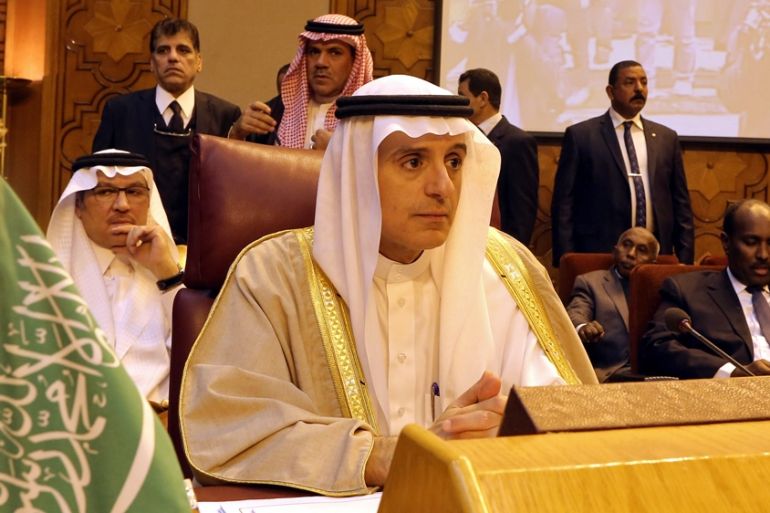Fears grow over Saudi-Iran row
Tit-for-tat moves by Middle East rivals dim rapprochement hopes and pose new challenge to regional security.

The war of words between Iran and Saudi Arabia has escalated, with the two Middle East rivals swapping accusations about endangering regional security and targeting their respective embassies.
The feud first erupted last week after Iranian protesters stormed the Saudi embassy in response to the execution of Nimr al-Nimr, a Shia religious leader in Riyadh. The incident set off a series of tit-for-tat diplomatic and economic reprisals.
Speaking from Cairo on Sunday, Adel al-Jubeir, Saudi Arabia’s foreign minister, renewed the Saudi accusation that Iran was interfering in Arab affairs and instigating “sectarian strife” in the region.
Iran responded by accusing Saudi warplanes of bombing its embassy in Yemen and that Riyadh was using the row to hurt peace talks in Syria.
READ MORE: Saudi Arabia vs Iran – Beyond the Sunni-Shia narrative
“The gap between Iran and Saudi Arabia is only getting wider by the day,” Saeid Golkar, an Iranian expert at the Chicago Council on Global Affairs, told Al Jazeera.
Golkar said the worsening situation “makes it more difficult for the two nations to establish rapprochement in the short term. It is unlikely that the two countries would engage in a direct armed conflict. Instead, they may resort to proxy wars in the region including in Yemen and Syria.”
In an interview with Al Jazeera’s Barbara Serra, Fawaz Gerges, head of the Middle East Studies at the London School of Economics, said that given the current diplomatic condition, he fears that conflict will continue in Syria and “nothing will come out” of the upcoming talks, where Saudi and Iran are also at odds.
Iranian public opinion
The execution of Nimr fired up public opinion in Iran, despite the fact that he was only known to a few people in seminary schools before his execution.
“The Iranian people don’t like this challenge,” Masoud Lavasani, a journalist who fled Iran and is now based in Turkey, told Al Jazeera, referring to Nimr’s execution.
![An Iran expert said the execution of Nimr was seen in Tehran as a provocation and an attempt to stir sectarian strife [Al Jazeera]](/wp-content/uploads/2016/01/ed910317e8da4386ae481c456f89339c_18.jpeg)
Nimr was executed in Saudi Arabia last week alongside 46 other people on terrorism charges. The Shia religious leader was accused and convicted of inciting violence in Saudi’s eastern province in 2011. He did not deny the political charges, but said he never carried weapons or called for violence.
The peaceful protests that followed Nimr’s execution reflected the anger among Iranians, but it was hijacked by hardliners, said Ellie Geranmayeh, a London-based Iran expert at the European Council on Foreign Relations.
Geranmayeh said, the incident “exposed to a global audience” the existence of “factions from the hardline camp that support these orchestrated mob attacks” in the country.
In Riyadh, Ahmed Alibrahim, Saudi affairs specialist and security analyst, told Al Jazeera’s Inside Story that if it were not for the attack on its embassy, “Saudi would not have cut its diplomatic relationship with Iran”.
Diplomatic route
Despite the tense political atmosphere, Geranmayeh said it is important for the two countries to pursue diplomacy.
She said Western powers play the “very important” role of trying to press both Saudi Arabia and Iran “to cool their escalation” that may lead to “major repercussions in the already unstable region”.
|
|
“I think mostly it’s going to be very important for Western actors to recognise the need to strike a balanced approach in this escalation,” Geranmayeh said.
Weeks before the latest diplomatic tussle, Iran and Saudi were, in fact, making significant progress that would have paved the way for the arrival of Riyadh’s new ambassador to Tehran, said Adnan Tabatabai, an Iran political analyst and founder of the Center for Applied Research in Partnership with the Orient in Bonn, Germany.
“So this incident is not necessarily within a chain of constantly deteriorating climate” between Iran and Saudi, Tabatabai said, referring to Nimr’s execution and the subsequent sacking of the Saudi embassy in Tehran.
“There have already been steps in the right direction, and this incident may just make it a bit more difficult. Indeed, it is difficult right now to improve the situation.”